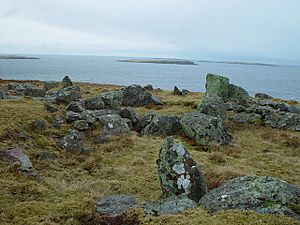Standing Stones of Yoxie facts for kids
Quick facts for kids Standing Stones of Yoxie |
|
|---|---|

Standing Stones
|
|
| Location | Shetland, Scotland |
| Built | Neolithic age |
| Lua error in Module:Location_map at line 420: attempt to index field 'wikibase' (a nil value). | |
The Standing Stones of Yoxie is an amazing ancient place in Shetland, Scotland. It's on the island of Whalsay, near the cliffs of Yoxie Geo. This site is also known as "Yoxie Biggins." It's part of a very old settlement called Pettigarths Field, which is about 4,000 years old! This settlement also includes another ancient building called Benie Hoose and a large stone tomb.
Contents
What are the Standing Stones of Yoxie?
The Standing Stones of Yoxie is a site from the Neolithic age. This means it was built during the New Stone Age. This was a time when people started farming and building permanent homes. The site is located on the northeastern coast of Whalsay, an island in Shetland. It's found close to the steep cliffs of Yoxie Geo.
What Did This Ancient Place Look Like?
At first, people thought this site was just a group of standing stones. But now we know it was actually a building with different rooms! The name "standing stones" comes from the fact that its walls were made from very large stones. Many of these huge stones are still standing today.
The building was once about 18 meters long and 11 meters wide. Not much is left of the northern part of the building. There is a main L-shaped section on the west side. A smaller open area, like a front yard, was on the east. We haven't found any signs of doors or door frames. A paved path made of stone runs through the house. This path continues into a round room, dividing it into two smaller areas.
Who Lived Here and What Did They Do?
It seems people lived at the Yoxie site for a very long time. Some local stories say that ancient priests called Druids used the stones for ceremonies. These stories even suggest that Druids might still live nearby at Benie Hoose!
However, the ruins at Yoxie are 4,000 years old. We don't have any written records of Druids until around 200 BC. This means the Druids lived much later than the people who built Yoxie.
Were They Temples or Homes?
An early explorer named C.S.T. Calder thought Yoxie was a temple. He believed Benie Hoose might have been where the priests lived. He felt that Yoxie and a similar site called Stanydale Temple were used for religious purposes. If he was right, these would have been the first known temples in the British Isles!
But today, most experts think differently. Societies in the early and middle Neolithic age probably didn't have special groups like priests. So, it's now believed that both Yoxie and Benie Hoose were actually prehistoric houses. They were homes where ancient families lived.
What Ancient Treasures Were Found?
Archaeologists have found many interesting items at Yoxie. Some finds are from the early and late Bronze Ages. Other things date back to the original Neolithic age settlement. There are also items from a later time, the Iron Age, when people lived here again.
Broken pieces of pottery have been found in both Yoxie and Benie Hoose. One large pot found at Yoxie was very similar to a "Bipartite Urn." This type of pot might have been used to store barley, an ancient grain. More than 120 simple stone tools have also been dug up at Yoxie.
 | George Robert Carruthers |
 | Patricia Bath |
 | Jan Ernst Matzeliger |
 | Alexander Miles |

